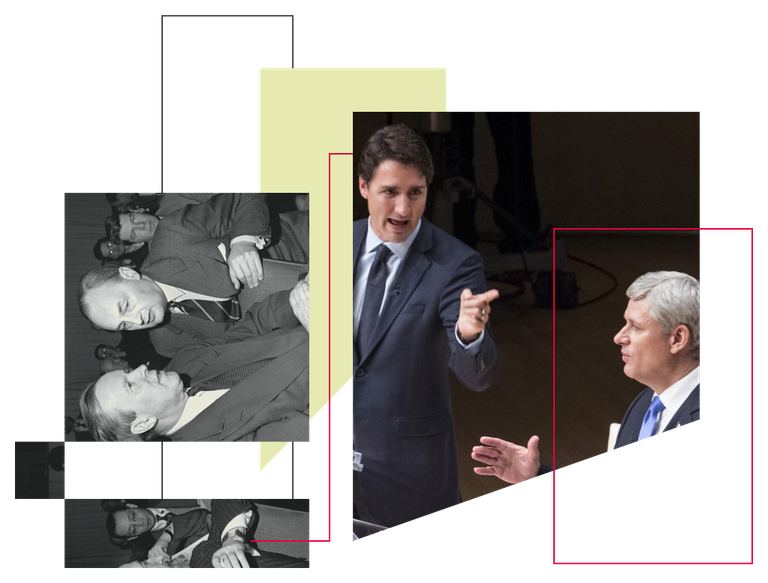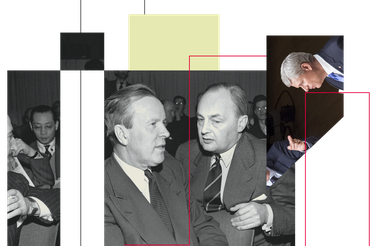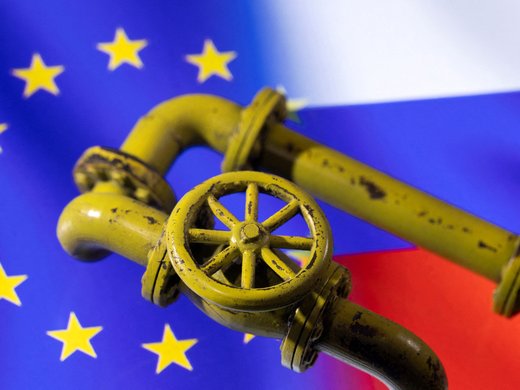This brief essay is a tribute to the excellent lines of Brendan Kelly sketching out with great economy the emergency of multilateralism as a major theme in Canada’s foreign policy, with all of which I agree. I am privileged to have been asked to add to them on this important, often misunderstood theme nearly systematically short-changed by Canada’s media unless a multilateral summit or ministerial meeting prompts some coverage or comment.
Multilateralism first became an option for Canada through the League of Nations. The country joined as a recent combatant in the First World War. Canadian Senator Raoul Dandurand, an iconic figure of the times, presided over the League’s assembly in 1925 and represented Canada in its council from 1927 to 1930. During the two world wars, Canada was subordinated to Britain and, to a lesser extent, to the United States, and by the end of the Second World War, needed to develop more of an autonomous international identity in order to free itself from outdated colonial strictures. Notably, its economic relationship with the United States had by then displaced that with Britain, and a foreign policy of its own became a necessity.
The early years of sketching the content of this policy coincided with the creation, exponential growth and expanding ambition of international organizations (some but not all linked to the United Nations), many of which Canada joined with enthusiasm. And it was Canada’s good fortune to have a confident prime minister, Louis St. Laurent (1948–1957), who was happy to leave much of the sketching of the policy’s content to the expert secretary of state for external affairs, Lester B. Pearson, during those same years. Pearson was a born multilateralist, not for sentimental reasons or due to altruism, but because he intuited that it was a field in which Canada could make its mark, and he proceeded to demonstrate the acuity of this perception throughout his tenure. Such thinking was hardly partisan; in the 1980s and early 1990s, the Progressive Conservative government of Brian Mulroney operated under similar assumptions.
Canada’s attributes in the field included: not having itself been a colonial power outside of North America; its enviable geographic position and the extent and variety of its land mass; its natural resource wealth; ideal conditions for farming in some regions; and only two contiguous neighbours, the United States, which has, despite many differences, been a good one, and the Russian Federation, across the inhospitable Arctic and the frigid waters surrounding it.
Canada’s most attractive feature internationally, and one that is rare, is its continuing and enthusiastic nature as a country that is welcoming to immigrants. It has a reputation for providing space for growing openness of mind, perhaps unlocked in part by the horrors of both world wars, and further encouraged by its growing number of communities drawn from a multiplicity of nations. Immigration from Europe (Hungary in 1956–1957 provided the last big wave) was soon overtaken by immigration from countries such as India, China and Vietnam. Somehow, so far, the experiment has been a happy, fairly harmonious one. The extent to which this aspect of Canada’s international identity plays in the country’s favour globally is sometimes underestimated within the country.
In terms of war and peace, in the wake of its role in the winning alliance of the Second World War, Canada fielded a considerable military force in the Korean War of 1950–1953, which travelled under the UN flag. It wisely sat out the Vietnam War, to the fury of US Presidents Lyndon B. Johnson and Richard Nixon, who were further irritated by Canada’s welcoming stance toward US draft dodgers, and also steered clear of most subsequent US-driven military ventures, except, for example, the defence of Kosovo against Serb attacks in 1999.
Since 1945, Canada’s diplomacy has both contributed to and refracted internationally through a variety of multilateral bodies (several of them regional in nature). Rightly, the example most often cited is the UN system. But Canada has also contributed to the North Atlantic Treaty Organization, not so much in terms of defence spending (which has been meagre, a perennial bone of contention with Washington), but, for example, through the opportunities Canada provides for pilot and other forms of training in the varying conditions of its generous geography. It has also joined several economic fora, including the General Agreement on Tariffs and Trade and its successor, the World Trade Organization; it participates in Group of Seven and Group of Twenty diplomacy; it has benefited greatly from its membership of the Organisation for Economic Co-operation and Development; and, in terms of regional bodies, it has joined both the Organization of American States and the Asia-Pacific Economic Cooperation forum, thus leveraging its economic weight and geographic reach. Sadly, other initially promising organizations to which Canada belongs have faded in international relevance over time, including both the Commonwealth and la Francophonie. If spread were all, Canada’s international relations would be a sure-fire winner. But, of course, this very spread has aroused differences over whether, in fact, Canada is spread too thin, and whether this effort yields positive tangible results for the country as well as the warm, fuzzy feelings of belonging it invokes. The Conservative government of Stephen Harper addressed the multilateral sphere with asperity; its successor, led by Justin Trudeau, has been more enthusiastic.
If spread were all, Canada’s international relations would be a sure-fire winner.
Canada’s international profile was at its zenith in the closing days of the Second World War and in shaping the peace that followed. During those years, Ottawa pressed for decolonization, while many of the colonial powers were ambivalent at best about facilitating it. Most developing countries retain some memory of this. And, as Kelly rightly documents, for several decades Canada’s diplomacy, increasingly global, proved energetic and deft under both governing parties.
For all these reasons, among others, multilateralism has appealed to Canada since 1919 and Canada, while often in an unfocused way, mostly appeals to other countries.
Regrettably, this proud claim can now be disputed, due in part to nearly 10 years of Stephen Harper’s skeptical world view (one he has broadened considerably since leaving office), and to a somewhat easily distracted Liberal government that has displayed admirable intentions but at times has failed to follow up convincingly. Kelly mentions the loss of an election to a UN Security Council seat in 2010, mostly attributable, in my view, to the Harper government’s early lack of warmth toward Africa (which holds 54 of 193 votes in the UN General Assembly) and an ill-timed falling out with Arab countries immediately before the vote. Further, Canada ran against two popular members, one of them, Germany, important. The other, Portugal, in spite of an odious past as a colonial power, has more recently cultivated with great skill a positive brand of international engagement, not least by leveraging its now excellent relations with those countries it used to oppress, including Brazil, Mozambique and Angola. The result was thus not entirely surprising.
But the outcome of the 2020 UN Security Council election was a shock, internationally as well as domestically. Canada’s opponents this time were two considerably smaller countries, Norway and Ireland, albeit each with a hard-earned, attractive international profile. Prime Minister Trudeau travelled the world widely and garnered significant media attention, mostly favourable, in the run-up to the vote. In spite of these efforts, and a much friendlier overall foreign policy than Harper’s interests-based calculations allowed his to be, Canada lost badly, not even able to force a run-off ballot.
It’s not clear what reflection in Ottawa this sorry result provoked. However, Canada thereupon made a deft move by nearly immediately appointing the well-chosen Bob Rae as its new envoy to the body, where he is widely considered a heavy hitter, so history has moved on.
An even more striking incident unfolded in 2018 within the Asia-Pacific multilateral sphere. Canada was an early supporter of a Trans-Pacific Partnership agreed to in 2016, from which US President Donald Trump, no fan of binding international agreements, defected soon after taking office. Following six months of diplomatic silence, Prime Minister Shinzo Abe of Japan pushed for the adoption of an adjusted text, known as the Comprehensive and Progressive Agreement for Trans-Pacific Partnership (CPTPP), which essentially removed a number of clauses the United States had strongly pressed for under President Barack Obama relating to labour rights and intellectual property.
The CPTPP text, thought to have been agreed by all the remaining members ahead of a signature ceremony in Hanoi in late 2017, had to be cancelled at the last moment thanks to second thoughts in Ottawa. Canada did sign on in 2018, having resolved whatever internal consultations still needed to be engineered, but that event in 2017, so offensive to the Japanese and wider Asian preference for predictability and order, points to a long-standing bias in Canadian foreign policy toward Europe, and perhaps also to a lack of understanding in political and senior official circles in Ottawa as to how Asia functions multilaterally and more generally.
Thus, we have come a long way from the days of Lester B. Pearson and Brian Mulroney. And, from a perspective shaped by la longue durée, it is by no means certain that the last 15 or so years have been brilliant ones for Canada at the international level. History, of course, may remember this period otherwise. Myopia prevails in day-to-day commentary, but the trend line raises more questions than comforting answers.
Personality, competence and experience all count in ministerial functions of an international nature. Knowing one’s counterparts, and appreciating as many of them as possible, an ability to seize the gist of complex files often previously completely unknown to new appointees, and a reputation for reliability are all assets not just in Asian but also in global multilateral and bilateral diplomacy. In little more than six years, Canada has offered the world five different foreign ministers, some excellent, others, nearly inevitably with such short tenures, above all forgettable.
Has the country lost the plot of how international, particularly multilateral relations function and what they require in the advancement of national interests? As we emerge from the COVID-19 crisis with depleted national coffers and a renewed widening gap in prosperity between the industrialized countries and developing ones, it may be helpful for Canada’s government to recalibrate its foreign policy instruments.
One measure of how serious an international player an industrialized country aims to be is the dynamism and level of its international aid program. In truth, Canada’s once proud performance on that front — several decades ago, it commanded resources exceeding 0.5 percent of gross national income, and, while never perfect, seemed relevant at country and continent levels throughout much of the developing world — has since then almost halved (in real inflation-adjusted terms), marked more by ministerial announcements than lasting impact in the field. This is not a particularly partisan trend: both governing parties have adduced reasons to cut the program back, although the current government, to its credit, has sought to rebuild it.
One measure of how serious an international player an industrialized country aims to be is the dynamism and level of its international aid program.
Today, Canada has one theme that resonates well with domestic reality and international need relating to gender equality, and another, embracing an admirable range of environmental goals, which suffers from insufficient funding and, at least somewhat, the handicap of Canada’s own poor performance on CO2 emissions. It has had four ministers responsible for international assistance in a little more than six years, one of whom was in the complex and demanding portfolio for less than a year. Overall, Canada’s official development assistance performance has underwhelmed relative to the country’s occasionally soaring rhetoric.
Ever since the emergence of Chairman Xi Jinping as the dominant leader of China, the seeming gradual radicalization of President Vladimir Putin of the Russian Federation and the election of President Trump in the United States, international relations have deteriorated considerably. Early hopes that the election of President Joe Biden in 2020 would usher in a lastingly more sober era within the United States, and perhaps internationally, have subsided. Every country’s foreign policy choices appear to be more constrained than they were 10 years ago. And this, at a time since early 2020 when national leaders have needed to contend domestically with the unanticipated, hugely disruptive and expensive COVID-19 pandemic.
Given this backdrop, and the urgent need for Ottawa to recalibrate its energy mix in years to come, it might be tempting simply to navigate only as far as the eye can see. This would be a lost opportunity to think about how Canada might craft a role for itself globally, not least within the multilateral sphere, amid the current turmoil — one seeking to help shape the international dispensation in keeping with its values and in support of its interests. Are we there yet?
I conclude with a modest plea from one living on the edge of the world’s economically most dynamic continent: we should not so much rebalance toward Asia, and by implication away from the trans-Atlantic sphere (which remains very important for Canada), but rather simply and determinedly up the country’s game in the Asia-Pacific region, including through multilateral channels. Meanwhile, we must continue to nurture the cross-party and public support for an active immigration policy that marks Canada’s brand so positively in an era that has been a depressing one for international relations writ large.
Author’s Note
I am delighted to participate in an essay series carrying the name of John Holmes, one of Canada’s outstanding early senior foreign service officers who rose very quickly to a senior level, and who then fell victim to the Canadian government’s discrimination against those of same-sex inclination during the 1950s and early 1960s, driven by McCarthyite panic in Washington. Leaving Ottawa when further advancement was foreclosed, he reinvented himself as one of the foremost scholars of Canadian foreign policy at York University and later at the University of Toronto, also serving as a dynamic leader of the Canadian Institute for International Affairs. During the 1950s, when I was a young child in Ottawa, John often came over to our family home for dinner on Sundays. He was a gentle, brilliant figure of admirable intellect and values very popular indeed with us kids.




